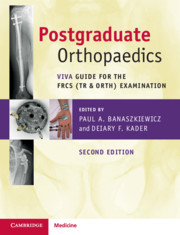Book contents
- Postgraduate Orthopaedics
- Postgraduate Orthopaedics
- Copyright page
- Contents
- Contributors
- Preface
- Acknowledgements
- Abbreviations
- Interactive website
- Section 1 The FRCS (Tr & Orth) Oral Examination
- Section 2 Adult Elective Orthopaedics and Spine
- Section 3 Trauma
- Section 4 Children’s Orthopaedics/Hand and Upper Limb
- Section 5 Applied Basic Sciences
- Section 6 Drawings for the FRCS (Tr & Orth)
- Index
- References
Section 3 - Trauma
Published online by Cambridge University Press: 15 November 2019
- Postgraduate Orthopaedics
- Postgraduate Orthopaedics
- Copyright page
- Contents
- Contributors
- Preface
- Acknowledgements
- Abbreviations
- Interactive website
- Section 1 The FRCS (Tr & Orth) Oral Examination
- Section 2 Adult Elective Orthopaedics and Spine
- Section 3 Trauma
- Section 4 Children’s Orthopaedics/Hand and Upper Limb
- Section 5 Applied Basic Sciences
- Section 6 Drawings for the FRCS (Tr & Orth)
- Index
- References
- Type
- Chapter
- Information
- Postgraduate OrthopaedicsViva Guide for the FRCS (Tr & Orth) Examination, pp. 181 - 350Publisher: Cambridge University PressPrint publication year: 2019

